The 8th China Geriatrics and Science and Technology Innovation Conference Cognitive Impairment Branch Forum and ACDC 2022 Annual Meeting
On November 26, 2022, sponsored by the Cognitive Impairment Branch of the Chinese Geriatric Society and hosted by Shenzhen Kangning Hospital, the "8th China Geriatric Medicine and Technology Innovation Conference on Cognitive Impairment Branch Forum and ACDC2022 Annual Meeting" was successfully held. The conference was held online, attracting more than 10,000 people online participation and attention, and the discussion atmosphere was warm.
Professor Fan Li, President of the Chinese Geriatric Society, and Professor Jia Jianjun, President of the Cognitive Disorders Branch of the Chinese Geriatric Society, attended the opening ceremony and delivered a speech. Professor Wang Yongjun, Director general of Cognitive Disorders Branch of Chinese Geriatric Society and Director of Clinical Psychiatry Laboratory of Shenzhen Kangning Hospital, presided over the opening ceremony.
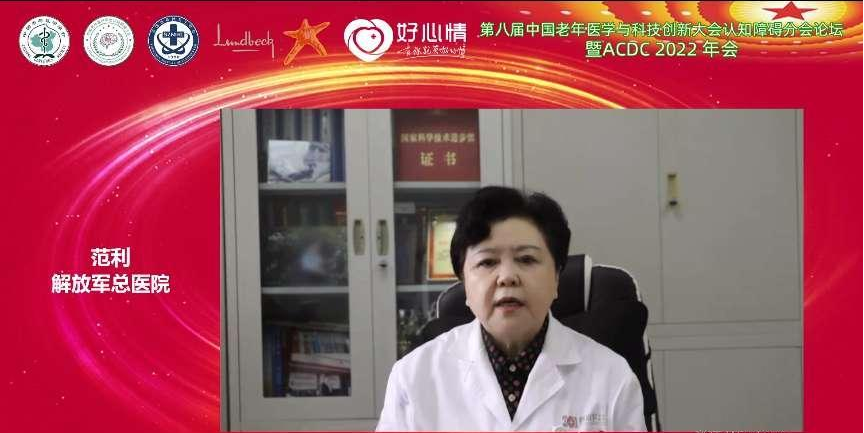 Professor Fan Li, president of the Chinese Geriatric Society, said that in recent years, the research and foundation in the field of cognitive disorders have developed rapidly, expanding from neuromedicine to the health management of the elderly, rehabilitation nursing, psychiatry and other aspects. The prevention and standardized diagnosis and treatment of cognitive disorders have been a hot issue in clinical and basic research, and also a major public health problem concerned by the whole society. In the past eight years since its establishment, the Cognitive Impairment Branch has done a lot of effective work, issued and promoted a number of expert consensus, carried out professional public welfare training activities for cognitive impairment care across the country, effectively built a communication and training platform with many elderly care institutions and grassroots institutions across the country, and promoted the standardization and systematic improvement of the management level of grassroots cognitive impairment care. This forum also invited a number of well-known experts in the field of cognition to give wonderful special lectures, in-depth discussion of our new ideas, new thinking and new progress in the field of cognition. It is believed that the high-level sharing of results by well-known experts will certainly bring a rich academic feast to the participants, and will bring benefits to the living standards and safety quality of the elderly. In conclusion, I wish this conference a complete success.
Professor Fan Li, president of the Chinese Geriatric Society, said that in recent years, the research and foundation in the field of cognitive disorders have developed rapidly, expanding from neuromedicine to the health management of the elderly, rehabilitation nursing, psychiatry and other aspects. The prevention and standardized diagnosis and treatment of cognitive disorders have been a hot issue in clinical and basic research, and also a major public health problem concerned by the whole society. In the past eight years since its establishment, the Cognitive Impairment Branch has done a lot of effective work, issued and promoted a number of expert consensus, carried out professional public welfare training activities for cognitive impairment care across the country, effectively built a communication and training platform with many elderly care institutions and grassroots institutions across the country, and promoted the standardization and systematic improvement of the management level of grassroots cognitive impairment care. This forum also invited a number of well-known experts in the field of cognition to give wonderful special lectures, in-depth discussion of our new ideas, new thinking and new progress in the field of cognition. It is believed that the high-level sharing of results by well-known experts will certainly bring a rich academic feast to the participants, and will bring benefits to the living standards and safety quality of the elderly. In conclusion, I wish this conference a complete success.
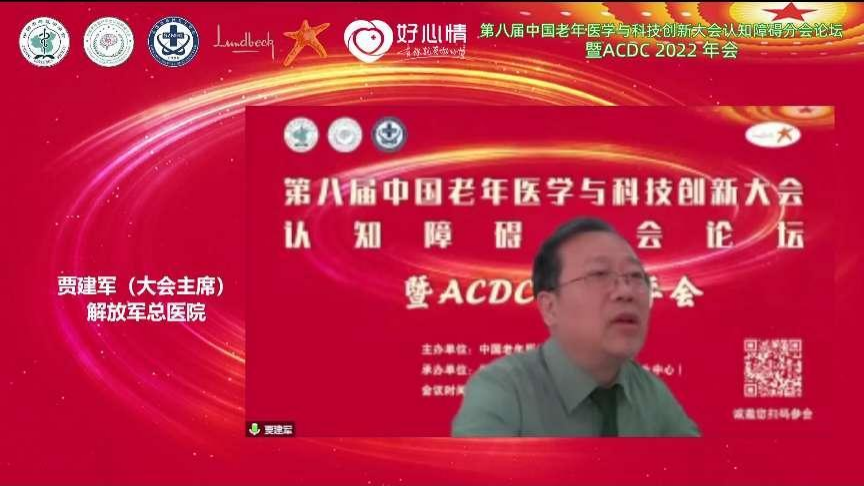
Professor Jia Jianjun, chairman of the conference and Chairman of the Cognitive Disorders Branch of the Chinese Gerontology Society, expressed his sincere thanks to the hard work of experts in the field of cognitive disorders over the years, and hoped that everyone would unite and forge ahead, and continue to make greater contributions to discipline construction, talent training, and scientific research ability improvement. It has become an industry model for the prevention, diagnosis and treatment and health management of cognitive disorders and related diseases in China. At the same time, it is emphasized that: First, the rapid development of digital medical treatment has put forward higher requirements for clinical and basic research of the society and all colleagues, and more in-depth thinking is needed for the innovative technology of accurate prevention, diagnosis and treatment of cognitive disorders. 2. Continue to follow and deepen the ACDC branch based on the current administrative division management model, and fully carry out relevant work. Finally, congratulations on the successful convening of the conference.
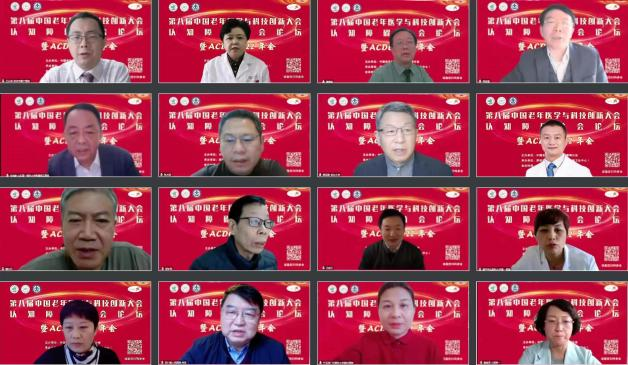
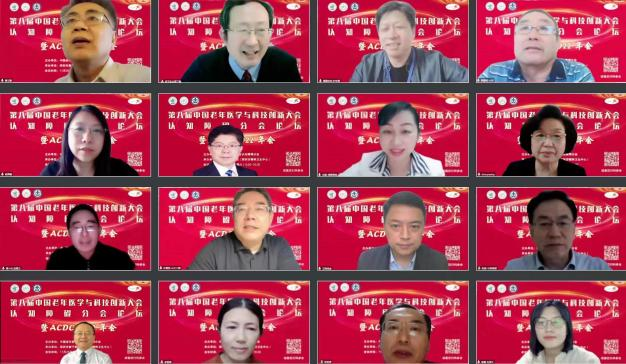 Group photo of participating experts
Group photo of participating experts
After the opening ceremony, famous experts from all over the country brought wonderful academic reports.
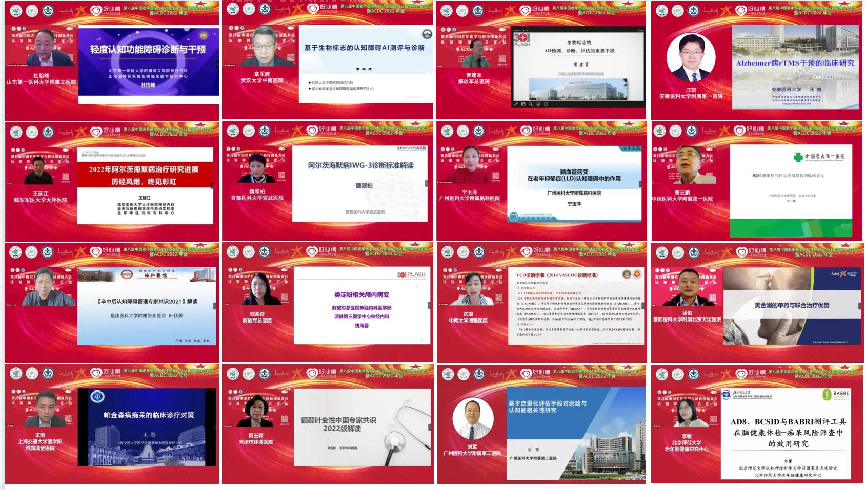 Professor Du Yifeng from Shandong Provincial Hospital taught that MCI is an important stage of cognitive dysfunction, which requires early identification, diagnosis and intervention. The application of biological markers is conducive to more accurate diagnosis and identification of MCI, and the control of MCI risk factors and multi-modal intervention have shown positive effects and good prospects. Disease modification therapy may be applied to the treatment of MCI-AD and mild AD in the future. Professor Zhang Junjian from Zhongnan Hospital of Wuhan University explained that AI assessment and diagnosis of cognitive impairment based on biological markers is playing an increasingly important role, providing a more effective solution for VCI with strong pathological heterogeneity; Chairman Jia Jianjun pointed out that AD is a continuous disease entity, and biological markers have indispensable value in predicting risk, evaluating progress, diagnosis and differential diagnosis, treatment and other aspects, but there may be limitations in clinical application, and it needs to be considered in various aspects. Professor Wang Kai from the First Affiliated Hospital of Anhui Medical University systematically introduced the clinical research and application prospects of precision rTMS technology in non-drug intervention of AD. Professor Wang Yanjiang of Dping Hospital of Army Military Medical University gave A presentation on the research progress in the diagnosis and treatment of cognitive disorders in 2022: The role of regulating risk factors and innovative cognitive rehabilitation in the tertiary prevention of AD. The current clinical trial results show that targeted Aβ drugs have good development prospects; Professor Wei Cuibai from Xuanwu Hospital showed that the diagnosis of AD is clinical biology, and there is evidence of specific clinical phenotype of AD and pathological biological markers of AD. Professor Ning Yuping from the Affiliated Brain Hospital of Guangzhou Medical University introduced in detail the role of cerebrovascular disease in LLD cognitive impairment. Controlling the risk factors of cerebrovascular disease can effectively prevent LLD and its accompanying cognitive impairment. Professor Cao Yunpeng from the First Affiliated Hospital of China Medical University made A detailed explanation from the clinical practice of Aβ positive and Alzheimer's disease, and the positive rate of Aβ in cognitively normal /SCD/MCI population. Professor Ye Qinyong of the Union Hospital Affiliated to Fujian Medical University explained in detail the Expert Consensus on the Management of Cognitive Impairment after Stroke, and the standardized prevention, management and medication of PSCI contributed to the clinical rehabilitation effect of patients. Professor Qian Hairong of PLA General Hospital gave a professional lecture on amyloid related intracranial lesions; Professor Shen Lu from Xiangya Hospital of Central South University explained the reunderstanding of common genetically related vascular cognitive impairment. Early intervention for presymptomatic patients carrying pathogenic mutations may delay the onset and progression of the disease, so as to achieve accurate diagnosis and treatment; Professor Xu Jun from Beijing Tiantan Hospital stressed that the treatment of Alzheimer's patients requires comprehensive management, and single drug treatment can comprehensively improve the three major symptoms of AD patients, and Memantine combined with Donepezil brings stronger and more comprehensive benefits. Professor Wang Gang of Ruijin Hospital Affiliated to Shanghai Jiao Tong University School of Medicine gave a keynote speech on the diagnostic criteria and treatment of Parkinson's disease dementia, pointing out that PD-MCI/PDD needs early diagnosis and treatment; Professor Zhou Yuying from Tianjin Huanhu Hospital summarized the most advanced research and recent methods in frontotemporal degeneration. Liu Jun from the Second Affiliated Hospital of Guangzhou Medical University presented an academic report entitled "Research on the Correlation between Cognition and Movement Based on Quantitative Assessment Methods", pointing out that quantitative assessment methods are more convenient and efficient than traditional cognitive assessment methods, and are expected to be applied in outpatient and community Settings. Li Xin, professor at the Geriatric Brain Health Research Center of Beijing Normal University, talked about the advantages of digital memory clinic in screening for cognitive disorders.
Professor Du Yifeng from Shandong Provincial Hospital taught that MCI is an important stage of cognitive dysfunction, which requires early identification, diagnosis and intervention. The application of biological markers is conducive to more accurate diagnosis and identification of MCI, and the control of MCI risk factors and multi-modal intervention have shown positive effects and good prospects. Disease modification therapy may be applied to the treatment of MCI-AD and mild AD in the future. Professor Zhang Junjian from Zhongnan Hospital of Wuhan University explained that AI assessment and diagnosis of cognitive impairment based on biological markers is playing an increasingly important role, providing a more effective solution for VCI with strong pathological heterogeneity; Chairman Jia Jianjun pointed out that AD is a continuous disease entity, and biological markers have indispensable value in predicting risk, evaluating progress, diagnosis and differential diagnosis, treatment and other aspects, but there may be limitations in clinical application, and it needs to be considered in various aspects. Professor Wang Kai from the First Affiliated Hospital of Anhui Medical University systematically introduced the clinical research and application prospects of precision rTMS technology in non-drug intervention of AD. Professor Wang Yanjiang of Dping Hospital of Army Military Medical University gave A presentation on the research progress in the diagnosis and treatment of cognitive disorders in 2022: The role of regulating risk factors and innovative cognitive rehabilitation in the tertiary prevention of AD. The current clinical trial results show that targeted Aβ drugs have good development prospects; Professor Wei Cuibai from Xuanwu Hospital showed that the diagnosis of AD is clinical biology, and there is evidence of specific clinical phenotype of AD and pathological biological markers of AD. Professor Ning Yuping from the Affiliated Brain Hospital of Guangzhou Medical University introduced in detail the role of cerebrovascular disease in LLD cognitive impairment. Controlling the risk factors of cerebrovascular disease can effectively prevent LLD and its accompanying cognitive impairment. Professor Cao Yunpeng from the First Affiliated Hospital of China Medical University made A detailed explanation from the clinical practice of Aβ positive and Alzheimer's disease, and the positive rate of Aβ in cognitively normal /SCD/MCI population. Professor Ye Qinyong of the Union Hospital Affiliated to Fujian Medical University explained in detail the Expert Consensus on the Management of Cognitive Impairment after Stroke, and the standardized prevention, management and medication of PSCI contributed to the clinical rehabilitation effect of patients. Professor Qian Hairong of PLA General Hospital gave a professional lecture on amyloid related intracranial lesions; Professor Shen Lu from Xiangya Hospital of Central South University explained the reunderstanding of common genetically related vascular cognitive impairment. Early intervention for presymptomatic patients carrying pathogenic mutations may delay the onset and progression of the disease, so as to achieve accurate diagnosis and treatment; Professor Xu Jun from Beijing Tiantan Hospital stressed that the treatment of Alzheimer's patients requires comprehensive management, and single drug treatment can comprehensively improve the three major symptoms of AD patients, and Memantine combined with Donepezil brings stronger and more comprehensive benefits. Professor Wang Gang of Ruijin Hospital Affiliated to Shanghai Jiao Tong University School of Medicine gave a keynote speech on the diagnostic criteria and treatment of Parkinson's disease dementia, pointing out that PD-MCI/PDD needs early diagnosis and treatment; Professor Zhou Yuying from Tianjin Huanhu Hospital summarized the most advanced research and recent methods in frontotemporal degeneration. Liu Jun from the Second Affiliated Hospital of Guangzhou Medical University presented an academic report entitled "Research on the Correlation between Cognition and Movement Based on Quantitative Assessment Methods", pointing out that quantitative assessment methods are more convenient and efficient than traditional cognitive assessment methods, and are expected to be applied in outpatient and community Settings. Li Xin, professor at the Geriatric Brain Health Research Center of Beijing Normal University, talked about the advantages of digital memory clinic in screening for cognitive disorders.
In conclusion, Professor Jia Jianjun, chairman of the conference, said that he congratulated the conference on its complete success, and thanked the leaders of the association, the lecturing experts and chairs, members and members of the association across the country, and representatives of related industries and industries for their strong support. President Jia Jianjun pointed out that we should strengthen the organizational construction and management of the branch, focus on standardization and promotion, and further expand the influence of the society. I hope all of you will unite closely, 踔厉, move forward bravely and bravely, and make our greatest contribution to the sustainable development of the cognitive field in China. Looking forward to the third International Forum next year!

